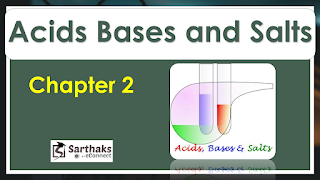NCERT Solutions Class 10 Science Chapter 2 Acids, Bases, and Salts
You can comprehend and thoroughly analyze Acids, Bases, and Salts with the help of the NCERT Solution for Class 10 Science Chapter 2. One of the most fascinating and significant chapters in the NCERT is on Acids, Bases, and Salts. One of the most crucial chapters in chemistry is this one. You may find answers to the exercises and the NCERT intext questions in this article.
Our NCERT solutions give you complete and in-depth knowledge of all the topics linked to Acids, Bases, and Salts because they are strictly based on the most recent CBSE syllabus. Acids, Bases, and Salts, Chapter 2 of the NCERT Solutions for Class 10 Science The chemical properties of acids and bases, acid and base tests, the reaction of acids and bases, the production of salts and chemicals made from common salts, litmus tests, the significance of pH in daily life, the water of crystallization, and other topics are all covered.
Your homework and tasks will go better if you have a
thorough comprehension of every subject connected to this chapter. According to
the test question paper from the year before, this chapter is the subject of
3–4 questions each year for the class 10 examination. As one of the simplest
and most crucial chapters, it is encouraged to practice and have a strong
understanding of this chapter to ace the test and receive all possible points.
Our NCERT Solutions Class 10 Science also includes intext questions, is very
well organized, and succinct, and includes a question with a practical
application for improved comprehension.
Sarthaks has carefully crafted
NCERT solutions for Class 10 Science that can help you understand the concepts
and learn how to answer properly in your board exams. You can also share our
link for free Class 10 Science NCERT solutions with your classmates. If you
have any doubts while going through our Class 10 Science NCERT solutions, then
you can go through our Video Tutorials for Science.
The
tutorials should help you better understand the concepts.



Comments
Post a Comment